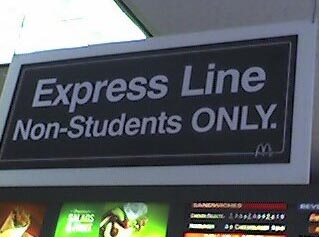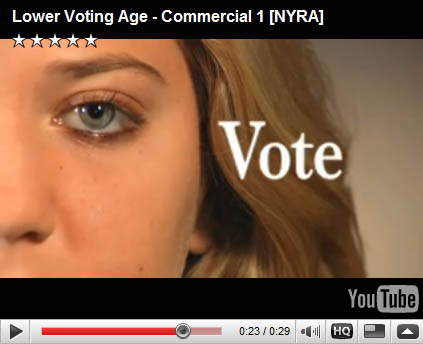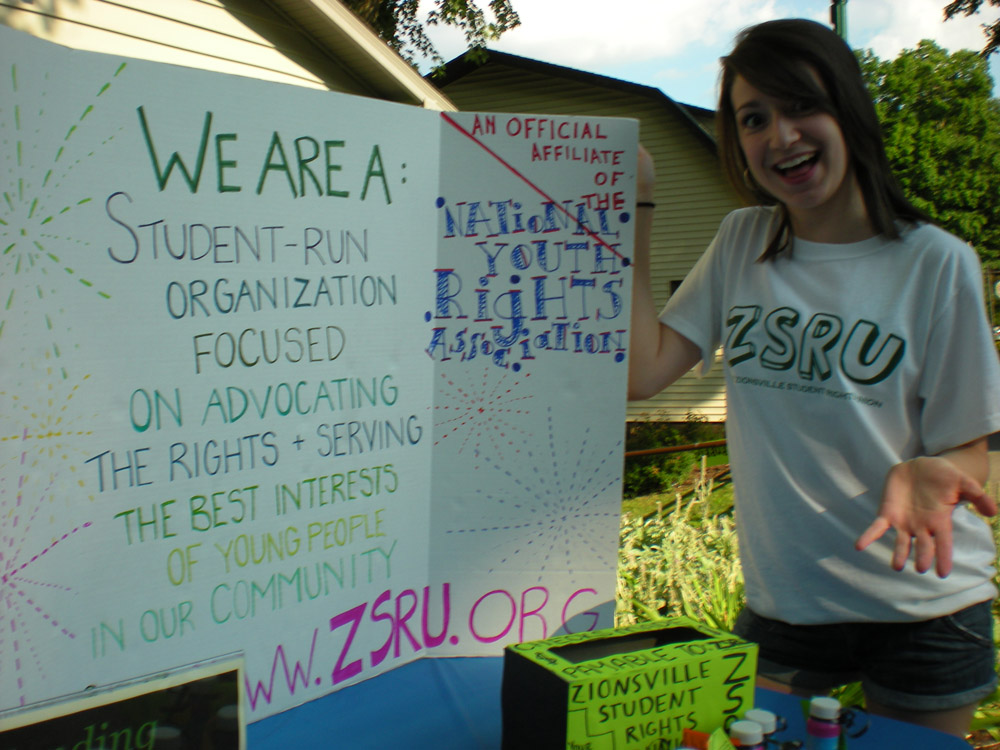NYRA Berkeley (2004 – 2007)
NYRA Vermont (2004 – 2007)
NYRA Bergen County (2007 – 2011)
NYRA Southeast Florida (2008 – 2011)
NYRA Zionsville Student Rights Union (2008 – 2010)
NYRA Berkeley (2004 – 2007)
NYRA’s Berkeley Chapter carried out our most successful push to lower the voting age in California.
Letter Writing Campaign. The chapter began in 2005 with a letter writing campaign to convince California Senate Majority Leader Don Perata, and former co-sponsor of Sen. John Vasconcellos’ bill to lower the voting age, to reintroduce a bill to lower the voting age this term. The campaign generated over 850 letters of support and raised widespread public awareness of the issue. Ultimately Sen. Perata declined to reintroduce the bill, but the chapter continued on to work with California Representative Loni Hancock.
The chapter chose to focus most of their energy on lowering the voting age in the city of Berkeley itself. The first step was bringing the proposal to the Berkeley Youth Commission, of which chapter member Rio Bauce was a member. The Youth Commission, an advisory body to the Berkeley City Council made up of local youth, was asked to support two things. First that the city council pass a resolution asking the state to give local choice to cities and counties wishing to lower their local voting ages, and secondly to amend the Berkeley city charter to lower the voting age to 16. Both measures passed the youth commission with a resounding 10-1 vote with one abstention. Having passed the youth commission, the proposals were placed on the city council’s agenda. The Berkeley chapter arranged dozens of meetings with city council members and the mayor. They received significant support and were optimistic going into the city council meeting on May 24, 2005. Unfortunately the measure did not pass. The vote, for the first measure to call upon the state to support local choice, failed with a vote of 4 in favor, 2 against, and 3 abstentions. After losing, the chapter adjusted its proposal to seek a voting age of 17 in school board elections only. The hope was that with a less ambitious proposal, they might find more council members willing to take this moderate first step.
San Francisco.
 The chapter carried the fight to San Francisco, and met with many members of the Board of Supervisors. After passing the San Francisco youth commission, it was put on the agenda for the Board of Supervisor’s meeting on July 12, 2005. Berkeley members, having seen this through from the beginning, were pleased to see the measure pass in San Francisco with a vote of 8 to 2. The resolution called upon the California legislature to allow cities and counties in the state to lower their local voting ages to 16. On that same day, July 12 2005, NYRA Berkeley attended a committee hearing and testified in favor of ACA 17, a bill in the California Senate to allow 17-year-olds to vote in primaries if they would turn 18 in time for the general election. Similar legislation has already passed in several other states. The bill passed committee with a vote of 4 to 2.
The chapter carried the fight to San Francisco, and met with many members of the Board of Supervisors. After passing the San Francisco youth commission, it was put on the agenda for the Board of Supervisor’s meeting on July 12, 2005. Berkeley members, having seen this through from the beginning, were pleased to see the measure pass in San Francisco with a vote of 8 to 2. The resolution called upon the California legislature to allow cities and counties in the state to lower their local voting ages to 16. On that same day, July 12 2005, NYRA Berkeley attended a committee hearing and testified in favor of ACA 17, a bill in the California Senate to allow 17-year-olds to vote in primaries if they would turn 18 in time for the general election. Similar legislation has already passed in several other states. The bill passed committee with a vote of 4 to 2.
The Berkeley voting age campaign has achieved tremendous success. Resilient and hardworking, the chapter worked on more levels, spoke with more politicians, generated more press coverage, and saw more successful passage of bills than any chapter in NYRA history. They met with officials and staff from the Berkeley city council, San Francisco board of supervisors, California State Senate, California State House, US Senate, US House, and the California Governor’s office. Berkeley’s tiresome campaign is a model for chapters everywhere.
NYRA Vermont (2004 – 2007)
NYRA Vermont began our first active campaign to lower the drinking age.
Campaign. In late January, Vermont House member Dick Marron introduced a bill to lower the drinking age to 18 in the state. T he recently formed Vermont chapter immediately set to work in support of this bill. During the next two months, Vermont leadership and other NYRA leaders worked on meticulously planning and preparing for an intensive two-week campaign in Vermont from March 28, 2005 to April 10, 2005. The newly installed Wiki software was utilized to create a comprehensive, well detailed campaign site. Many different people, both in Vermont and outside, contributed to the planning and research stage of this campaign. This campaign was remarkable for the degree to which it was planned and thought out ahead of time.
National Support.
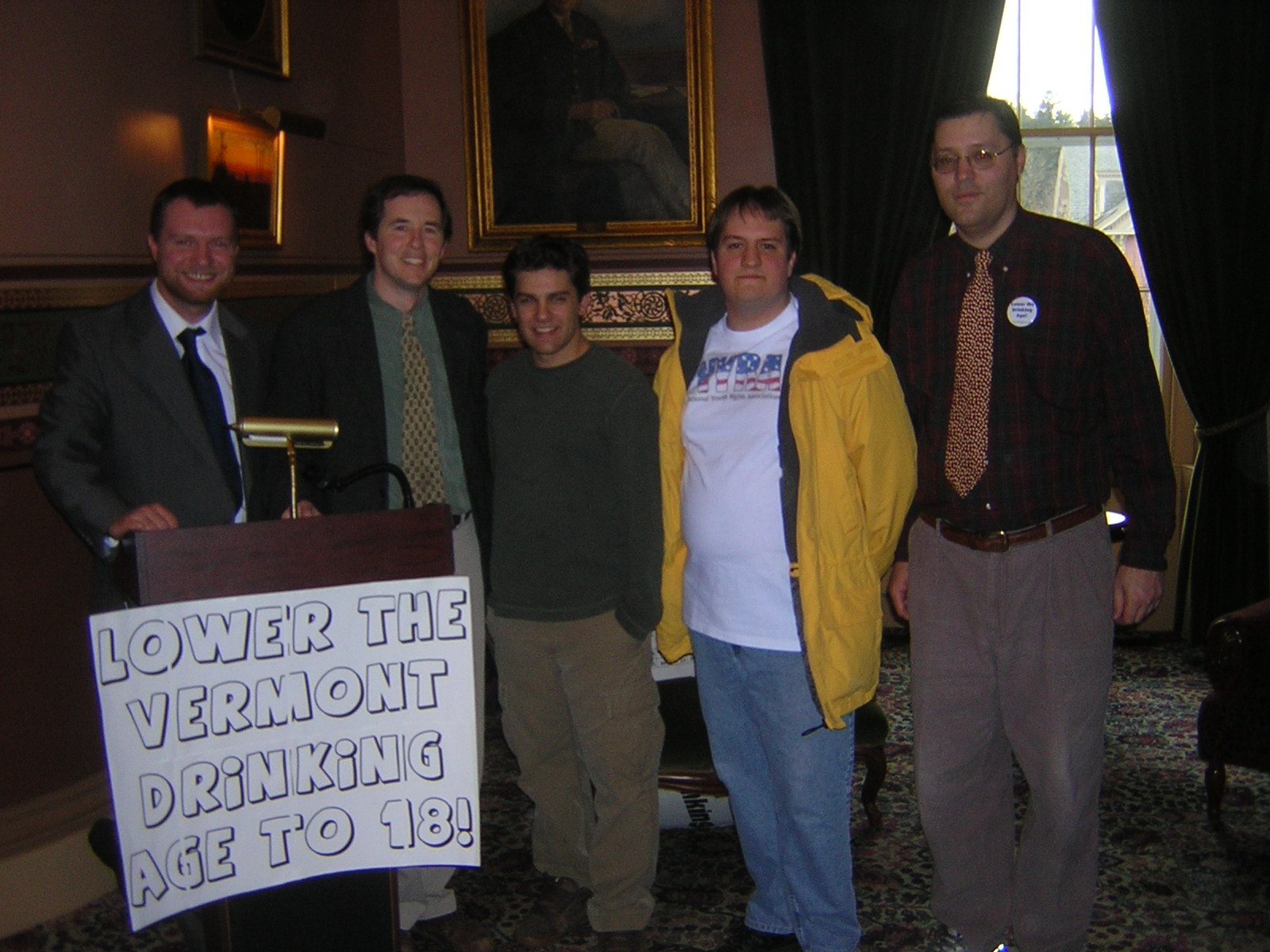 In total, 6 out-of-state members traveled to Vermont to assist with the campaign and were nicknamed the “invading horde”. The Horde consisted of Matt Malone from Boston, Jonathan Galinsky from New York, and Alex Koroknay-Palicz, Dave Varney, Alexis Grant & Rio Samsie from Washington, DC. This “invading horde” worked closely with Vermont members, especially Hardy Machia, Jay Leff, Ken Boring and Heavenly Ryan.
In total, 6 out-of-state members traveled to Vermont to assist with the campaign and were nicknamed the “invading horde”. The Horde consisted of Matt Malone from Boston, Jonathan Galinsky from New York, and Alex Koroknay-Palicz, Dave Varney, Alexis Grant & Rio Samsie from Washington, DC. This “invading horde” worked closely with Vermont members, especially Hardy Machia, Jay Leff, Ken Boring and Heavenly Ryan.
Media Coverage. The two week campaign was as intensive, productive and successful as any NYRA campaign to date. The chief strategy of the campaign was to travel to colleges across the state and ask students to fill out postcards expressing their support for Rep. Marron’s bill to lower the drinking age. This would demonstrate to the Vermont legislature extensive support for the bill, and build a large list of supporters for the Vermont chapter. This strategy was tremendously successful. NYRA visited most of the colleges in the state during those two weeks and 2000 individuals filled out postcards in support of lowering the drinking age. The campaign generated serious media coverage in the state through newspapers, radio and television. The campaign even prompted editorials in states such as Maine and Indiana, TV coverage in Massachusetts and a huge article in the New York Times. Being a small state, a large number of people heard about the organization and the drinking age issue due to NYRA’s very active campaign. Several students at schools across the state have begun forming subchapters of NYRA-Vermont in response to our campaign.
NYRA Bergen County (2007 – Present)
NYRA-Bergen County, headed by high school junior Eric Kim, scored a victory in the fight against age discrimination by successfully desegregating a local McDonald’s restaurant. In late 2007, the restaurant implemented and began enforcing a policy restricting one of their cash registers to customers 21 years old and older. This policy was ostensibly to serve adults faster during the lunch hour, but the segregation was enforced at all hours, and Eric and his new chapter saw it as ageist discrimination to be worked against. They responded with a concentrated letter-writing campaign, followed by an in-person meeting with restaurant management. After this initial attempt didn’t work, all it took to get the McDonald’s management to change their policy was a reminder of New Jersey’s laws against age discrimination. On the heels of this victory the chapter continued their success, aiming for bigger and better things. Eric met with his town to discuss the possibility of placing a youth representative on the city council, and to ask for the mayor’s support for lowering the New Jersey voting age to 17. The chapter also met with New Jersey state legislators to discuss drafting a bill to lower the voting age.
New Leadership. In the wake of Eric’s success, Chris Hardy restored the Bergen County NYRA Chapter as Chapter President. Under Chris’s leadership, the chapter organized protests and ran a door-to-door campaign to raise awareness about the unconstitutionality of Kyleigh’s Law. Chris’s most notable achievement was the formation of the Student Defense Commission (SDC) at his high school. Chris was frustrated by the relationship of bitter distrust between his school’s administration and student body, so he took it upon himself to rectify this relationship through the creation of a student defense program. The chapter took on a number of cases through the Student Defense Commission and was met with a great deal of success. Chris also founded the Midland Park Student Association which goes door to door informing the populous of the general area about the impact of budget cuts on the high school system.
Student Defense Commission. The Student Defense program was established to provide representation to students charged with wrong doing at school. The program assigned a student advocate to defend any student threatened with detention, suspension or expulsion from school. In one case, several students were accused of swearing at a teacher. The teacher did not hear them say anything, but punished the students because she saw them mouth curse words. Chris Hardy brought in faculty from the school’s hearing impaired department to testify that there was no way that someone untrained in lip reading could correctly identify words mouthed to them. Thanks to his work the accused students were able to avoid punishment. Another example involves two minority students who were searched and suspended. The chapter convincingly argued that the high school was unjustly targeting minority students. The school removed the suspension from their record and issued a formal apology to the students. The chapter’s great success did not go unnoticed by the school’s administration. In fact the Student Defense Commission’s work became such a nuisance to the administration that the principal shut down student government. NYRA-Bergen County President Chris Hardy was also President of student government and the principal thought she could simply disband it to make him go away. She was wrong. Despite threats from the principal Hardy continued to unofficially meet with the student government and led a successful campaign to get the program reinstated at the school. Chris Hardy’s successes earned him a Hugh O’Brien Youth Leadership Award for his contributions to youth rights.
NYRA Southeast Florida (2008 – 2011)
Voting Age Campaign. Soon after its creation, the NYRA Southeast Florida Chapter began its quest to lower the voting age in the State of Florida to 16. The chapter conducted formative meetings with its Board of Directors and other key members and began creating its website at www.16ToVote.org. On June 14th 2008, WPBF, the local ABC television affiliate, aired an interview with several members of the Board. In addition, on June 26th, Boca News featured NYRA SE FL in a front-page article. Both the Associated Press and Palm Beach Post interviewed the chapter’s president Jeff Nadel and published articles. NYRA Southeast Florida representatives met with two Florida State representatives and State Senator Ted Deutch about lowering the voting age. On November 29th, 2008, President Jeffrey Nadel spoke at the meeting of the Palm Beach Legislative Delegation, which is comprised of state representatives and senators whose districts include parts of Palm Beach County. There, he explained NYRA-SEFL’s effort to lower the voting age in Florida and encountered a very positive reception. In December 2008 , Nadel spoke to the Board of Trustees of Saint Andrew’s School along with the leaders of the Republican Club and the Young Democrats about youth empowerment and the importance of lowering Florida’s voting age. On March 25th, 2009, chapter members used their Spring Break to travel to the State Capitol in Tallahassee, Florida for an intensive week of lobbying on the issue. They met with eighteen legislators in three days, securing commitments of sponsorship for NYRA-SEFL’s effort to lower the voting age in Florida to sixteen.
Election Day Rally.
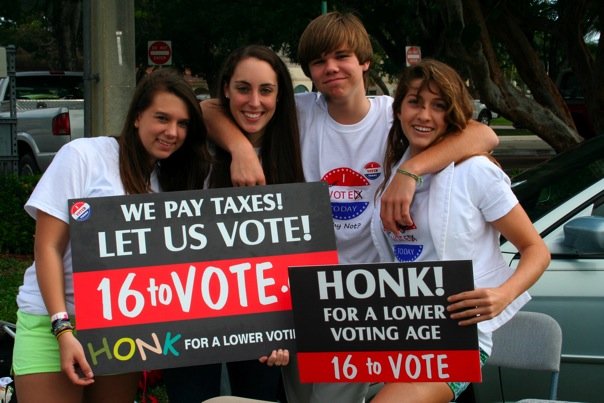 In November 2008, NYRA-SEFL held the largest Election Day event in NYRA’s history. The chapter applied for funding from Youth Venture to help cover the costs of the November rallies. NYRA-SEFL received the largest grant to date, a full $1,000. The funds were used to purchase signs, brochures and t-shirts for the Election Day rally. In preparation for the event, founding President Jeffrey Nadel and Vice President Zachary Goodman spoke to students in the “Pre-Law” program at Jeaga Middle School in West Palm Beach on November 3rd, 2008. They conducted a mock election for the forty students and spoke about NYRA-SEFL’s efforts to lower the voting age to sixteen and about the importance of youth rights in general. On November 4th, 2008, after months of planning, 50 members of NYRA-SEFL rallied at five different polling places in the area. They disseminated information, answered questions and solicited signatures for a voting age petition. Precinct captains were appointed to manage each group of members. Members distributed over 1,500 brochures, held up signs and answered questions from the public. Not only were many voters reached through this effort, but several lawmakers as well. The overall response was extremely positive. The rally was covered by local and university press.
In November 2008, NYRA-SEFL held the largest Election Day event in NYRA’s history. The chapter applied for funding from Youth Venture to help cover the costs of the November rallies. NYRA-SEFL received the largest grant to date, a full $1,000. The funds were used to purchase signs, brochures and t-shirts for the Election Day rally. In preparation for the event, founding President Jeffrey Nadel and Vice President Zachary Goodman spoke to students in the “Pre-Law” program at Jeaga Middle School in West Palm Beach on November 3rd, 2008. They conducted a mock election for the forty students and spoke about NYRA-SEFL’s efforts to lower the voting age to sixteen and about the importance of youth rights in general. On November 4th, 2008, after months of planning, 50 members of NYRA-SEFL rallied at five different polling places in the area. They disseminated information, answered questions and solicited signatures for a voting age petition. Precinct captains were appointed to manage each group of members. Members distributed over 1,500 brochures, held up signs and answered questions from the public. Not only were many voters reached through this effort, but several lawmakers as well. The overall response was extremely positive. The rally was covered by local and university press.
In August 2008, NYRA started the “Make NYRA Famous” contest, calling on members to create a NYRA ad. NYRA-Southeast Florida won the contest with an ad highlighting the fact that young people want to vote, but can’t. Chapter members wrote, produced, filmed and starred in the ad. The ad was a huge public awareness success for NYRA even before it hit the airwaves. The professional, passionate ad was distributed widely online and was picked up by numerous blogs, websites and student newspapers. Many people and groups who had never heard of the National Youth Rights Association and the campaign to lower the voting age were introduced to it this fall. Thanks to the buzz about the ad, NYRA scored its most impressive media appearance of the year with both NYRA Executive Director Alex Koroknay-Palicz and NYRA-Southeast Florida President Jeffrey Nadel quoted in USA Today. Finally, in late October 2008 the ad aired 14 times on Comedy Central during the Daily Show and the Colbert Report. These shows captured NYRA’s prime audience – politically savvy young people. NYRA received a great deal of positive attention from the ad and raised its profile greatly among youth and organizations in Washington, DC.
NYRA SEFL filed a lawsuit against West Palm Beach’s curfew law. The law bans everyone under 18 from the downtown district from 10 p.m. to 6 a.m. on weekdays and 11 p.m. to 6 a.m. on Fridays and Saturdays. NYRA-SEFL began researching case law in September 2008 and built a solid legal case demonstrating the unconstitutionality of the law. On March 11th, 2009, NYRA-SEFL’s President and Vice President attended a City Commission meeting. They were accompanied by a camera crew and reporter from WPTV, the local NBC affiliate. It soon became clear that the city was not going to budge, so NYRA-SEFL retained well-known civil rights attorney Barry Silver who had recently won a high-profile case against the city of West Palm Beach defending the rights of the homeless. On March 30th 2009 the chapter attracted additional press coverage from the Palm Beach Post and the local ABC affiliate. May 1st is recognized as “Law Day,” a holiday meant to reflect on the role of law in the foundation of the United States and to recognize its importance for society. On May 1, 2009, NYRA-SEFL held a protest march through downtown West Palm Beach during the restricted curfew hours. They were interviewed by CBS-12 and WPTV. On June 23rd, 2009, NYRA-SEFL filed its lawsuit against the City of West Palm Beach, marking the first lawsuit filed by a youth-led civil rights group against a youth curfew. After the lawsuit, National Youth Rights Association of Southeast Florida, Inc., et al. vs. City of West Palm Beach, was filed, NYRA-SEFL held a press conference. The press conference occurred at 10:01 PM, a minute after curfew enforcement begins on weekdays. The filing was covered by WPTV (NBC affiliate), WPBF (ABC affiliate), CBS-12 (CBS affiliate), and WFLX (FOX affiliate). Just two weeks earlier the New York Court of Appeals struck down the youth curfew law in Rochester, NY in a 5 to 2 decision saying it violated the constitutional rights of teenagers and parents, providing an excellent backdrop against which to introduce NYRA’s first anti-curfew lawsuit.
Boca Raton Cell Phone Searches. NYRA Southeast Florida received reports from students at Boca Raton Community High School that the school was searching through confiscated cell phones for incriminating information. The school would look through text messages, pictures, videos, and call records to find anything they could use against students. If the cell phone was locked, the student was forced to turn over hir or her passcode or receive in-school suspension. One search of a cell phone often led to searches of other student’s cell phones when the school looked up other students they have contacted. NYRA President Jeffrey Nadel sprung to action to address this violation of student rights. He consulted with legal experts and then wrote a letter on July 25 2011 to the school’s principal demanding the school cease these searches immediately. The letter prompted a whirlwind of press attention in the area. Nadel was interviewed by the Sun Sentinel, the Palm Beach Post, the Examiner, the local NPR affiliate, CBS-12, Fox-29 and NBC-5. The response was overwhelmingly positive. Legal experts with the local TV stations confirmed that the school’s policy was clearly illegal and the chairman of the school board came out and said this policy cannot go on.
NYRA Zionsville Student Rights Union (2008 – 2010)
The ZSRU Chapter began as an independent student group but became a NYRA affiliate to further their success.
iPod Ban.
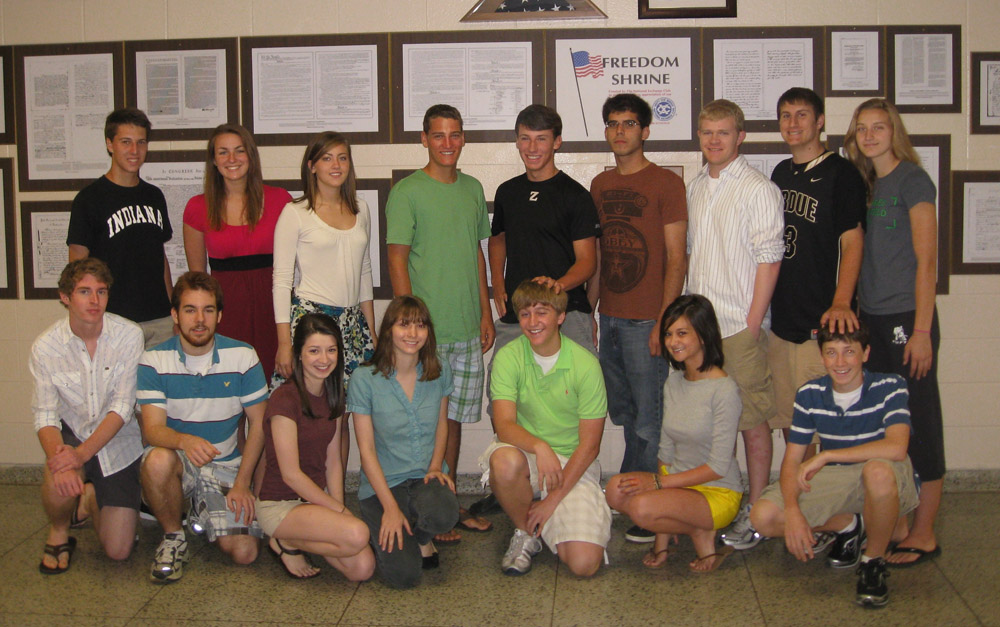 The Zionsville Student Rights Union formed in response to an iPod ban at Zionsville Community High School. On March 3, 2008 the high school administration sent out a memo informing the school that a comprehensive ban on iPods within the school would be rigidly enforced. Steve Ross and Taylor Campi decided to form the Zionsville Student Rights Union and immediately began recruiting. By the end of March, a quarter of the student body had registered. The newly formed Zionsville Student Rights Union appointed a board, drafted organizing documents and outlined their three main purposes which were to defend student rights, advance student interests and serve the community and its youth. The ZSRU introduced themselves to the administration on March 19, 2008. Over the course of the spring, chapter leadership held several productive meetings with the administration and became to be recognized as a respected voice of the student body. Thanks to these meetings the school ended the iPod ban, stopped teachers from reading student text messages from confiscated cell phones, discussed a controversial Athletic Code of Conduct and worked to permit students freer access to restrooms. The Union became an official local affiliate of the National Youth Rights Association on October 10, 2008.
The Zionsville Student Rights Union formed in response to an iPod ban at Zionsville Community High School. On March 3, 2008 the high school administration sent out a memo informing the school that a comprehensive ban on iPods within the school would be rigidly enforced. Steve Ross and Taylor Campi decided to form the Zionsville Student Rights Union and immediately began recruiting. By the end of March, a quarter of the student body had registered. The newly formed Zionsville Student Rights Union appointed a board, drafted organizing documents and outlined their three main purposes which were to defend student rights, advance student interests and serve the community and its youth. The ZSRU introduced themselves to the administration on March 19, 2008. Over the course of the spring, chapter leadership held several productive meetings with the administration and became to be recognized as a respected voice of the student body. Thanks to these meetings the school ended the iPod ban, stopped teachers from reading student text messages from confiscated cell phones, discussed a controversial Athletic Code of Conduct and worked to permit students freer access to restrooms. The Union became an official local affiliate of the National Youth Rights Association on October 10, 2008.
Final Exam Reform Initiative. The ZSRU met with the school’s principal in the summer of 2008 and began a long series of negotiations with the school administration and faculty toward a goal of granting seniors who maintained a certain grade in the class an exemption from final exams. In the fall the chapter administered a survey of the school’s teachers to get their feedback on the current exam structure and found that a majority of them favored change. With the teachers on their side the ZSRU and the school administration formed a nine member teacher committee to discuss changes to the school’s exams. In the end the committee endorsed ZSRU’s proposal and recommended that seniors with a 90% or above in any given class be exempt from that class’s spring final exam. This plan was put into place in the spring of 2009.
The Sleep to Succeed Project was an initiative to rearrange school start times between primary and secondary schools in the Zionsville Community School (ZCS) district. The project originated in an AP English class, in which ZCHS senior Erica Park presented compelling information regarding the effects of school start time on student academic performance and student health—both physical and psychological. In her research, Park concluded that starting school later for adolescents, and in exchange earlier for elementary students, would be beneficial to all parties involved. The Zionsville Student Rights Union recognized the importance of this change and adopted Park’s proposal as an official campaign. Chapter leaders met with the school administration, the school board, athletic directors, transportation boards and other stake holders about their Sleep to Succeed plan. All were impressed with the research and arguments put forward by ZSRU, but many obstacles stood in their way. Changing the start time affects bus schedules for elementary schools and middle schools in the district as well as schedules for all sports teams in their division. ZSRU conducted extensive research on how the change could be implemented with minimal disruption to the athletics schedule. At a school board meeting in the spring of 2010, the Zionsville school board voted unanimously in favor of pushing back the start time from 7:30 am to 8:15 am. ZCHS became one of very few high schools to take this step that all experts agree is best for students, and only did so due to committed student advocacy.
The Zionsville C.A.R.E.S. Campaign. In January 2009, the ZCHS SADD (Students Against Destructive Decisions) chapter began discussing a proposal for random student drug testing at the school. The ZSRU got wind of these discussions quickly, and developed two strategies for combating this dangerous idea. The first strategy involved proposing a partnership between SADD and the ZSRU to find alternative methods of drug abuse deterrence; the second strategy was a full-blown offensive—a plan for a massive and crushing public opinion campaign aimed at fighting any attempts to implement random student drug testing. After some discussion (and internal strife in the SADD chapter) a partnership between the organizations was formed to seek open, honest and comprehensive drug education instead of drug testing. The ZCHS Assistant Principal offered SADD & the ZSRU an opportunity to speak at a Town Hall Community Conversation. On April 30, 2009, the ZSRU and SADD presented the material to a group of over 150 students and Zionsville residents. Steve Ross opened the “Community Conversation” with a ten minute presentation explaining why drug testing is ineffective, citing a University of Michigan study on the subject. Ross also gave an overview of the cost inefficiency of random drug testing, providing the average prices per student for different types of drug tests. Finally, Ross presented what the ZSRU and SADD agreed would be the ideal educational plan to combat dangerous drug abuse while keeping the fourth amendment safe too. The meeting was then opened into a discussion, in which ZSRU & SADD leadership fielded questions and addressed concerns. The meeting was an enormous success, and won the ZSRU a great deal of public praise and support. Public opinion seemed to be staggeringly against random drug testing in the community’s schools. The meeting also garnered a bit of publicity after an article in the Zionsville Times-Sentinel. On May 12, 2009, ZSRU leadership met with Zionsville Chief of Police Rick Dowden, who at the meeting suggested using federal grant money to create a voluntary counseling/treatment program coupled with education for both students and parents. The meeting went very well, and the group left with a plan to implement a two-pronged program, based on education and rehabilitation, that will promote responsibility in decision-making with regard to substance abuse. The campaign has since been renamed “Zionsville C.A.R.E.S.” (Community Action for Responsibility and Education against Substance-abuse) to reflect the fact that random drug testing is no longer regarded as even a viable possibility in the Zionsville community.




